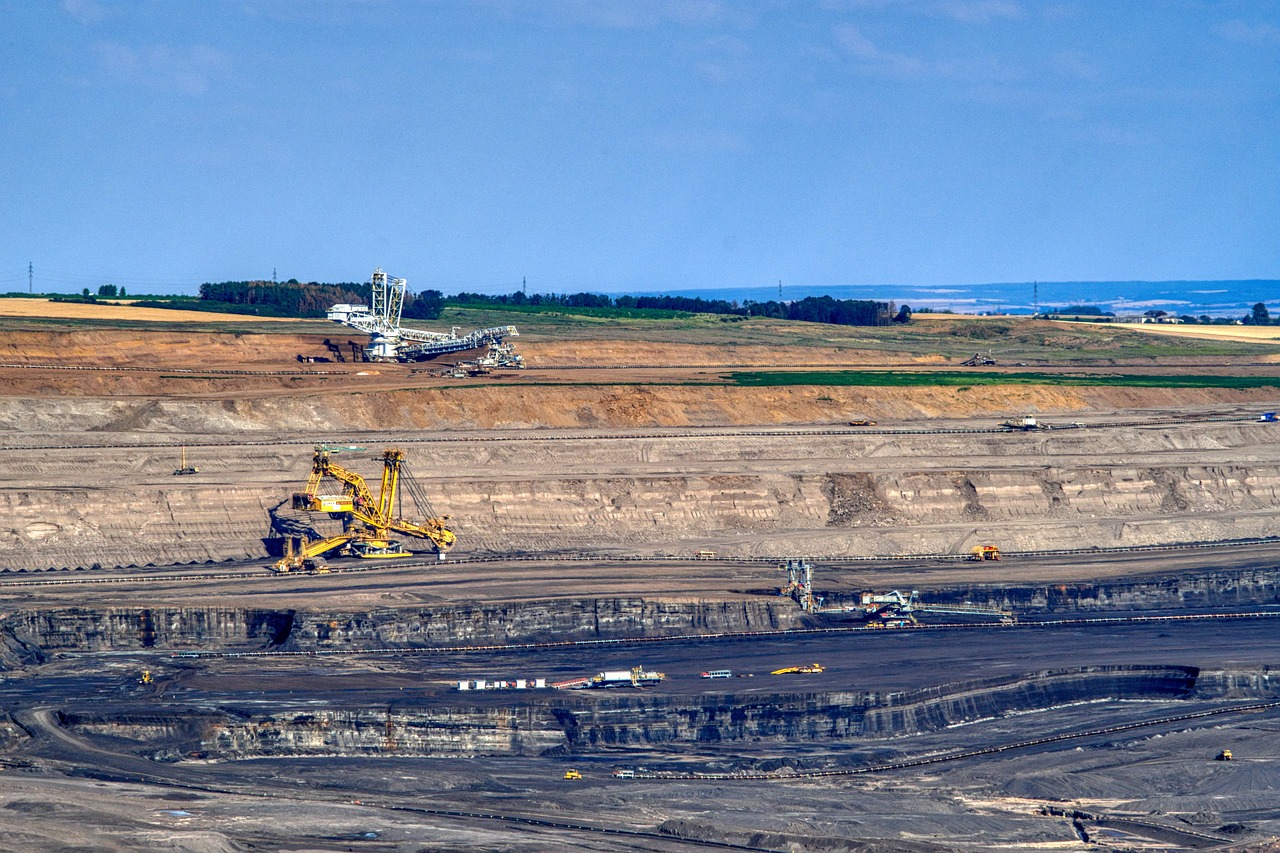Discover how modern mining is revolutionizing global resource management in "From Earth to Industry: How Modern Mining Is Transforming Global Resources." Explore cutting-edge techniques, sustainability advancements, and the impact of technological innovations on the extraction and use of essential minerals. Learn how today's mining shapes tomorrow's industries.
For many years mining has played a role in advancing human civilization by supplying vital materials that support various industries like manufacturing, infrastructure and technology all crucial for societal progress and economic development. However recent technological breakthroughs along with growing sustainability initiatives and changing global demands are bringing about significant transformations in the mining sector. Contemporary mining methods, driven by advancements in automation, data analysis and eco-friendly practices are revolutionizing the extraction and processing of resources improving efficiency and minimizing environmental impact. These innovations not reshape the operations of the mining industry but also influence a wide range of related fields such as construction and electronics. Consequently, global resource management strategies are evolving to adopt more sustainable and responsible practices that address present day challenges and future requirements.
1. Advanced Extraction Technologies: Redefining Efficiency
The mining industry has been revolutionized by advancements in extraction technologies which have enhanced operational precision and efficiency. The introduction of drilling systems, data driven exploration techniques and real time monitoring tools has not only elevated safety standards but also minimized human error. These innovations empower companies to pinpoint mineral deposits with unmatched accuracy, streamline operational expenses and offer immediate insights, into equipment functionality and environmental factors. This transformative shift in mining practices has resulted, in improved efficiency and safety measures.
The mining industry is changing by using automation and technology to improve efficiency and support sustainability. This includes using robots, machines and advanced data analysis to streamline resource extraction increase productivity and reduce waste. Artificial intelligence and data management systems optimize every stage of the extraction process minimizing environmental impact and land disruption. Automated systems ensure precision in drilling and blasting while tools allow for monitoring and predictive maintenance. This strategy is crucial, for meeting the global demand for minerals and mitigating negative environmental effects like habitat destruction, soil erosion and water contamination. By prioritizing advancements and sustainable practice the mining sector can find a balance between economic growth and environmental preservation.
2. Sustainable Mining Practices: Reducing Environmental Impact
The mining sector is adopting eco-friendly approaches to tackle its adverse effects like deforestation, habitat destruction, water pollution and soil degradation. To lessen disruptions and waste creation carbon capture techniques, leaching and comprehensive land rehabilitation strategies are being put into action. Carbon capture technology captures dioxide emissions during mining and processing activities, thereby lessening the carbon footprint. Reclamation efforts concentrate on restoring areas maintaining soil health and safeguarding water resources. These environmentally initiatives seek to reduce harm while facilitating resource extraction processes.
Recycling and repurposing tailings the leftover materials from mining after mineral extraction contributes to sustainability efforts. These approaches help recover resources reduce the need for new ore extraction and minimize waste generation. As the need for minerals like lithium, cobalt and nickel grows mining companies are embracing eco-friendly approaches. This approach focuses on using resources responsibly and aligning industry growth with broader goals. Through recycling and reprocessing initiatives mining firms can lessen their environmental impact and contribute to a circular economy.
3. Critical Minerals and the Shift Toward Renewable Energy
The increasing demand for minerals such as copper, lithium and rare earth elements is fueled by their importance in renewable energy advancements. Copper plays a role in cars and solar panels lithium is used in batteries and rare earth elements are crucial for wind turbine generators. Mining companies are intensifying their efforts to extract these minerals not to meet market demands but also to position themselves as contributors to the global sustainability movement. By enhancing extraction capabilities investing in technologies and adopting eco-friendly practices mining operations are facilitating the transition towards clean energy sources and ensuring a consistent supply of these crucial resources. This approach reinforces their role as enablers of a future that prioritizes sustainability and environmental stewardship.
The mining sector is working on enhancing the way it extracts and processes resources by adopting environmentally friendly technologies. The goal is to lessen harm and enhance the well-being of communities. The industry is also introducing practices to make resource usage more efficient cut down on waste and lessen its impact on the environment. This shift is essential for a future as it harnesses renewable sources such as wind and solar power in a responsible manner. Through these initiatives the mining industry aims to play a role in the global move towards a more sustainable and harmonious energy ecosystem.
4. Innovation in Processing: Smarter Refinement and Recycling
The mining sector is experiencing a change driven by advancements in mineral processing that boost efficiency and minimize environmental impact. Cutting edge refinement methods such as automation and monitoring have increased operational accuracy and energy efficiency. Resulting in a smaller carbon footprint and the extraction of valuable by products. Hydrometallurgical techniques utilizing chemistry offer an eco-friendly option compared to conventional approaches by lowering energy use and emissions. This transition promotes sustainable development and enhances resource utilization.
The growing focus on a circular economy is driving progress in recycling and reprocessing methods that are transforming the mining sector. This approach seeks to minimize waste and maximize resource value by promoting reuse, recycling and effective material use. Mining companies are turning to scrap materials and e waste to find minerals in a bid to reduce the need for extracting new resources and lighten the environmental impact. Advanced recycling techniques allow for the extraction of minerals from discarded products like old devices that contain valuable metals such as gold, silver and palladium. This not helps lessen the environmental impact of mining but also creates opportunities for generating revenue in resource limited areas.
5. Digital Transformation and Smart Mining
The mining industry is evolving as it embraces methods. This involves leveraging advancements like Internet of Things (IoT) devices, cloud computing and artificial intelligence to improve efficiency in operations. These innovations enable real time monitoring of machinery performance, operational conditions and environmental aspects by collecting data. By harnessing this data predictive maintenance can be performed and well-informed decisions can be made resulting in reduced equipment malfunctions and disruptions in operations. The incorporation of these technologies signifies a change in the mining industry increasing productivity, effectiveness and environmental consciousness.
The use of blockchain technology is transforming the sector by improving visibility and trackability across the supply chain. This advancement establishes a distributed electronic record system that protects transactions promotes ethical sourcing and upholds the trustworthiness of the supply chain. By providing insights into the origins of minerals blockchain builds trust, with consumers and stakeholders. Moreover, it plays a role in preventing fraud counterfeiting and discrepancies within the supply chain. The integration of blockchain in the mining sector promotes practices and aligns with sustainability and corporate responsibility goals.
6. Social Responsibility and Ethical Mining
The global mining sector is focusing on being responsible by ensuring that the benefits of resource extraction are shared with nearby communities. Maintaining practices is essential in today’s operations, which include fair working conditions community engagement and support for local infrastructure projects. Companies must adhere to regulations and obtain certifications to protect human rights and uphold environmental norms. These protocols involve impact assessments regular inspections and alignment with international standards. The commitment to these ethical principles goes beyond compliance; it forms a part of modern business strategies aimed at building relationships with communities and fostering sustainable development.
The mining sector is changing its approaches due to rising consumer expectations and government rules. Shoppers are seeking products sourced which is pushing industries to steer clear of conflict minerals and unsustainable methods. Authorities and regulatory bodies are implementing oversight measures to ensure that mining activities comply with strict social and environmental responsibility guidelines. This change is prompting the industry to be more transparent and responsible. Businesses are now working to reveal their practices and history, in social responsibility and sustainability. This evolution is in line with a movement towards adopting corporate social responsibility where industries are held answerable, for their effects on society and the planet.
7. Climate Change Adaptation and Resilience
The mining industry is grappling with the task of minimizing its environmental impact and adjusting to the challenges posed by climate change. The increasing frequency of weather incidents such as hurricanes, floods and heatwaves put the operations of mining companies at heightened risk. These disruptions can cause damage disrupt supply chains and endanger worker safety. To address this issue firms are investing resources, in infrastructure development disaster response planning and enhancing operational flexibility. This strategy focuses on safeguarding against unexpected climate events while maintaining a seamless flow, in production processes.
Mining firms are lessening their carbon impact by incorporating energy options such as wind, solar and hydropower into their energy mix. This change decreases reliance on fossil fuels and reduces emissions linked to mining operations. Moreover, companies are enhancing energy efficiency embracing technologies and investing in research to mitigate environmental harm. This shift aligns the mining industry with worldwide initiatives to address climate change and meet sustainability objectives. Through these actions mining companies are establishing themselves as key players in fostering a future-safeguarding long-term operations and promoting environmental sustainability.
Conclusion
The mining sector is going through a change driven by advancements and worldwide demand. It is positioning itself as a key player in resource extraction and sustainability. New extraction techniques are being used to improve efficiency and lessen environmental impact. This transition shows a dedication to being environmentally conscious and upholding ethical standards. With industries relying more on minerals and renewable technologies the importance of mining practices is growing. Addressing these obstacles calls for teamwork between companies, authorities and individuals. Through collaboration key players can create a future where resource extraction and utilization are balanced to fulfill global demands while protecting the planet. This teamwork is vital, for establishing a sustainable and mining industry.


























